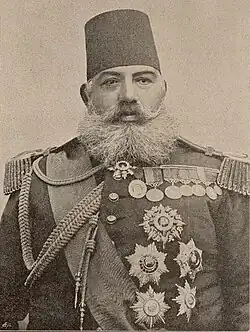Mehmed Riza Pasha
Mehmed Riza Pasha | |
|---|---|
 | |
| Birth name | Mehmed Riza |
| Born | 1844 Istanbul, Ottoman Empire |
| Died | 1920 (aged 75–76) Istanbul, Ottoman Empire |
| Allegiance | |
| Branch | |
| Rank | Serasker |
| Battles / wars | Russo-Turkish War (1877–78) |
Mehmed Riza Pasha also known as Serasker Riza Pasha (Turkish: Serasker Mehmet Rıza Paşa; 1844–1920)[1] was an Ottoman[2] military commander. He achieved the rank of Serasker, the highest military rank of the Ottoman Empire.[3] He participated in the Russo-Turkish War (1877–78).
Career
He was born into a family of Turkish origin.[4] In 1867, he graduated from Mekteb-i Harbiye with the rank of Mülâzımı.
He was exiled to France following the end of the Ottoman dynasty. He had three sons: Sureyya Pasha,[5] Ziya Bey and Sukru Bey. Ziya Bey accompanied his father to France, where they resided in Nice. The home in Nice bears a plaque indicating his residence.
At the command of the 2nd Army, the 1st Regiment in Shumen was assigned to the 3rd Battalion and 4th Division. At the Ministry of War, he trained newly recruited rifles in Crete. He attracted the attention of the Governor and Commander of Crete Muşir Omar Pasha and was appointed chief master. However, two or three days later he resigned and returned to Istanbul.
In 1870, he was promoted to captain. In 1871, he took part in the suppression of the Malisör Rebellion in Shkodra. In 1874, he joined Şahin Pasha's retinue in the reorganization of the School of Medicine.
In 1875, he was promoted to major. Upon the outbreak of the Montenegrin rebellion, he served as the deputy battalion commander in Muğla in Trebin. Müşir Süleyman Hüsnü Pasha joined his entourage in the 93 War.
During the war, he was promoted to Kaymakam by Süleyman Hüsnü Pasha and was awarded Order of the Medjidie (4th rank). He was captured by the Russian Army during the Battle of Shipka Pass. After 6 months he returned to Istanbul. Due to his good relations with Süleyman Pasha, then detained in Istanbul, he was appointed to Liva Attorney General under the command of Emin Pasha, who was injured in Kosovo. When Emin Pasha was on the Greek border, he went to Yenişehir. During the collision with the Greeks there, he resigned from the military when he received a telegram from his family in Istanbul asking him to search his home. Circassian gave up his resignation at the request of Abdi Pasha.
In 1881 he was promoted to Miralay and was appointed Commander of the Izmit Redif Regiment. In 1885, upon the events in Cisr-i Mustafapaşa, he transferred to Edirne with his regiment. When the place of duty was recovered by his soldiers, he was summoned to the Yildiz Palace in Istanbul by Sultan Abdulhamid II. After this meeting, the Sultan ordered him to be promoted to Mirliva and continue in Edirne.
He was the commander of Fırka in Edirne between 1885 and 1888. In 1888 he was called to Istanbul and Sultan Abdul Hamid II assigned him to the command of the 2nd Firka tasked with the Guard. On 3 September 1891 he was promoted to Ferik and then to Mushir and appointed as Serasker. From September 5, 1891, to July 23, 1908, he served as a serasker.
He died in 1920. He is buried in the courtyard where the tomb of Mahmud II is located, along with other notables. His house survives on the Bosphorous.[6]
References
- ^ "Hüla-i hirt". stnbl. 1907.
- ^ Sicill-i Osmanı̂ p;178 (1996)
- ^ German Staff Officer, Karl Julius W. Viktor von Strantz, Modern Warfare: as illustrated by the Greco-Turkish War By Greco-Turkish War, 1900, pp. 284-189.
- ^ Sicill-i Osmanı̂ p;178 (1996)
- ^ Süreyya Opera House
- ^ "Serasker Rıza Paşa Yalısı (Üsküdar) - USLANMAM". www.uslanmam.com. Archived from the original on 2009-09-18.